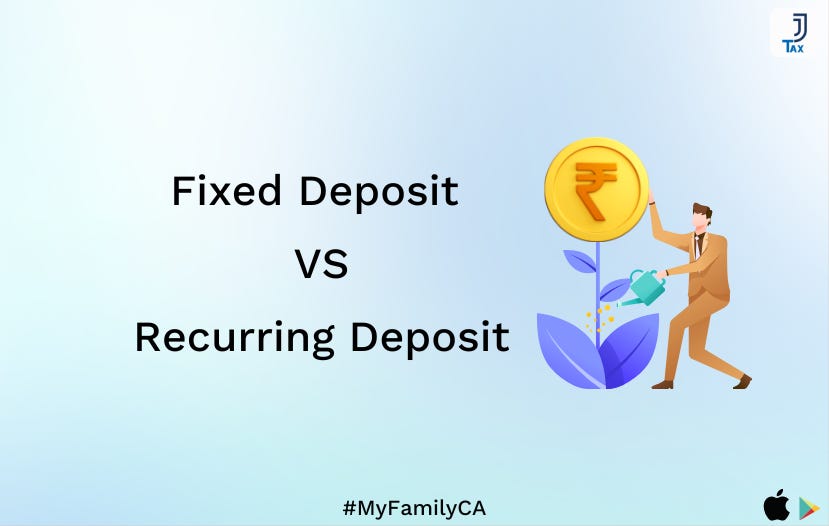RD vs FD
What is Fixed Deposit (FD)?
A fixed deposit, as its name suggests, is an investment choice where both the investment period and the interest rate are predetermined. At the start of the tenure, which normally lasts between 7 days and 10 years, you can invest once. You receive the principal sum at maturity. You have the option of receiving the interest on the fixed deposit either on a regular basis or when it reaches maturity.
What exactly is a Recurring Deposit (RD)?
Recurring deposits involve the monthly deposit of a set sum into a bank or other financial institution. The interest rate is also set for the duration, which is normally between six months and ten years. You receive the principal sum at maturity. You have the option of receiving the interest on the recurring deposit either on a regular basis or when the account reaches maturity.
Common FD and RD Characteristics
Examining the similarities between fixed deposits and recurring deposits will be helpful to decide which is best for you.
Investments with a fixed income: FD and RD are both fixed-income investments. At the start of the tenure, their interest rates are set, and they stay that way for the duration of the investment period. Furthermore, changes in the market have little impact on interest rates. The bank and other such financial organisations guarantee the returns or maturity revenues of both investment alternatives.
Known Returns
You can know the maturity amount for FD and RD as soon as you make an investment. Based on the tenure, sum, and rate of interest, you can estimate the maturity amount. By associating your financial goals with the FD or RD amount, you are able to make advance plans. You may figure out how much money you need to set aside each month to achieve financial objectives like paying for your child's school, getting married, going abroad, doing home renovations, and more, using an RD calculator.
Withdrawal prematurely: Withdrawal prematurely is permitted for some FD types and RD with a penalty. For instance, in the case of Axis Bank, you may withdraw up to 25% of the fixed deposit's original amount without incurring any fees. However, there is a premature penalty in the case of additional withdrawals or if the sum surpasses 25%.
Loan option
Both fixed deposit and recurring deposit amounts are eligible for a loan. You can utilise the withdrawal amount however you like. The maximum loanable amount varies from one bank to the next.
Services Provided
The following are some of the benefits that fixed deposits and recurring deposits provide:
Both FD and RD accounts can be opened in a variety of ways, including online and through mobile banking. Having a nominee for your deposit is advised. You might even create a joint account with a member of your family. This makes sure that, in the event of your absence, someone will always be able to claim the maturity funds from your account.
You can open RDs and FDs in the names of your spouse, parents, and children, as well as other close family members. So both FDs and RDs are excellent options for gifts. For instance, you may start an FD in your child's name on their birthday. When kids reach adulthood, the maturity income might be used for their schooling or other costs.
Which one should you pick: FD or RD?
People who can afford to invest a small amount each month but do not have a sizable chunk of money to invest should choose a recurring deposit over a fixed deposit. The complete amount or the maturity amount will be credited to your linked savings or current account at the end of the RD term after monthly deposits have been made.
However, if you have a large sum of money to invest all at once, a fixed deposit is your best bet. Due to the larger initial principal, you will be able to receive higher interest rates.
You should choose a cumulative FD as well if you want better returns. Here, the interest collected in a given cycle (monthly, quarterly, semi-annually, or yearly) is reinvested with the initial deposit amount rather than being credited to your connected account. This will raise the principal, and because interest is computed on a higher principal in the following cycle, you will receive higher returns.
Fixed and recurring deposits are risk-free investment options. You will make more money from a fixed deposit than from a recurring deposit, however, some people prefer recurrent deposits to fixed deposits since they don't have enough money to invest all at once. Decide accordingly, taking affordability into account.



